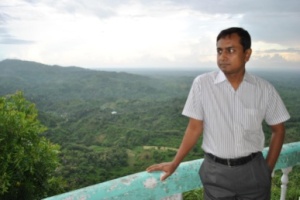See the presentation “Private Rural Service Provision System“, the Samriddhi project in Bangladesh (presented by Shamim Ahamed, Helvetas Bangladesh).

Shamim Ahamed presenting the Samriddhi project
Comments and questions raised after the presentation (by Maurizio Guadagni, World Bank)
- Really reached 1 million. Strong economic focus with relatively good inclusiveness
- Capacity to reach many beneficiaries thanks to high population density. Strong M&E to follow income ad inclusiveness. 750,000 poor beneficiaries and 250,000 non poor. 3 poor beneficiaries per one non-poor (less than $1.25 per day are considered poor)
- How did the market work for poor? Market system development: value chain, support function by private companies, and enabling environment (including Government)
- Role of local public institutions: an initial assessment identified constraints to enter in the value chain. Usually the role of public institutions is limited. Exception: medicinal plants are grown in public land, and public institutions need to allocate land for this
- Market for the Poor (M4P)
- Private companies and government agencies are providing training. What is the challenge? To formal introduce private sector providers is politically difficult for governments
- How much do the non-poor pay? Training are paid equally by farmers. They all pay the full cost. Farmers may individually contract the Service Providers
Key messages and conclusion by Maw Maw Soe (SDC Myanmar):
- Land allocation
- Strategy for M4P approach in livelihood project
- Strategy of capacity development program among user group
- The role of each stakeholder (farmer, user, private sector and government)
- Lobby and advocacy still needed (government policy enhance for inclusiveness)
Key messages and conclusion by Sediqi Sayed Jamaluddin (Helvetas, Afghanistan):
- Project had good linkage with all stakeholders
- Good record keeping and clean data
- Encourage private sectors and organizations


